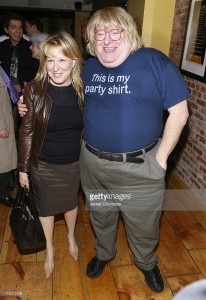Unicorn Booty
TV Writer Bruce Vilanch Tells Us How He Slipped Sly Gay Jokes Past the Censors
May 7, 2017
By Matt Baume
Regular Contributor

Bruce Vilanch was toiling away in a perfectly adequate newspaper job in Chicago when Bette Midler came to town. She wasn’t quite famous at that point — an appearance on Broadway and some bathhouse concerts were her credits — but Bruce went to check out her show. Afterwards, he wrote a glowing review, and she called to thank him.
“You should talk more,” he told her.
“You got any good lines?” she asked. He did, and she hired him.
Forty years later, Bruce’s work has touched just about everyone in America. He’s written some of the most famous variety shows ever broadcast, crafted jokes for the Oscars and Emmys and Tonys for decades, and has appeared on everything from RuPaul’s Drag Race to Hollywood Squares to The Simpsons.
I interviewed Bruce Vilanch on my podcast The Sewers of Paris, where every week I talk to gay men about the entertainment that changed their lives. For Bruce, an important early influence were big movie and stage extravaganzas like The Greatest Show on Earth and a Carol Channing flop called The Vamp.
“I taught myself to read with the movie ads,” he recalled. He was obsessed with showbiz from an early age, though his parents tried to steer him toward more reliable work as a doctor or lawyer. They’d take him to films set in courtrooms and point out that attorneys get to perform; but he knew he needed a different kind of limelight.
“I used to have a routine in a hula skirt that was embarrassing to everyone,” he said. “I would have taken a job on the hood of your car, jiggling as you drove.”
An adventurous aunt told him stories of the world and accompanied him on trips into Manhattan. He attempted a career on stage, but discovered that his look and his skills were a little too idiosyncratic. So he went into journalism, and that’s where he had his big break when he wrote about Bette Midler.
“She found the beauty in trash,” he said of her at the time. She’d come out on stage looking a little disheveled and unpredictable, though “the talent was there.” Audiences loved it, particularly when she was on tour and told jokes about local landmarks and figures. The secret of those jokes was that Bruce would leverage his journalism connections to write them, calling colleagues at local papers to find out what the big scandals were before Bette arrived in town.
Eventually, he made his way to Los Angeles, where he’d get his start writing variety shows for Cher, the Brady Bunch, and the Manhattan Transfer. When he could, he’d slip sly queer references into the shows, though they always had to be coded.
“Did you feel exasperated that you couldn’t say gay?” I asked him during our chat.
“It was challenging,” he replied. “It wasn’t frustrating because it hadn’t been done. … That was a couple years off.”
Nevertheless, he still delighted in the sly gay references he was able to place in shows like Hollywood Squares. “It was ‘inside,’ we called it,” he said. “The ones who get it will laugh and the ones who don’t will say ‘what was that?’”
It’s a vastly different world now, of course. But the freedom that gay writers and comedians now have on television is only possible because of pioneers like Bruce.
Listen to the full interview with Bruce below or at SewersOfParis.com.



